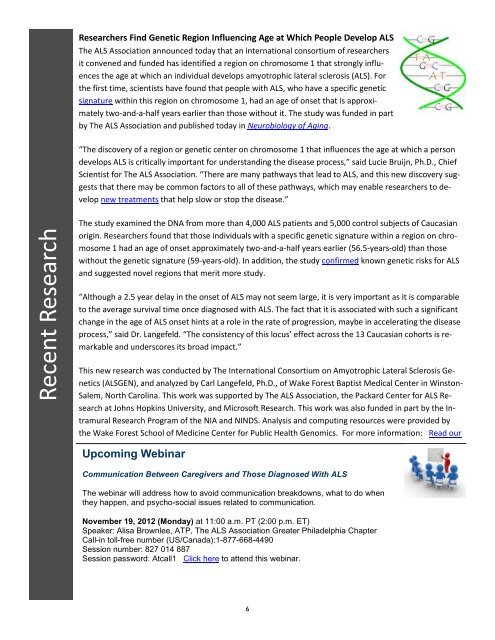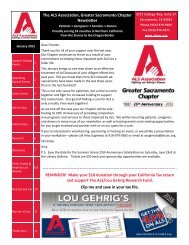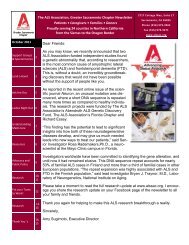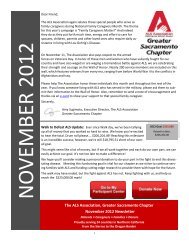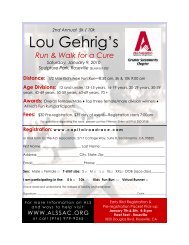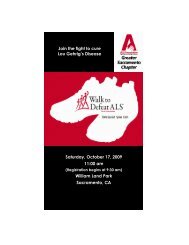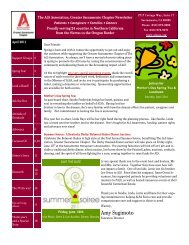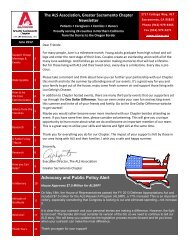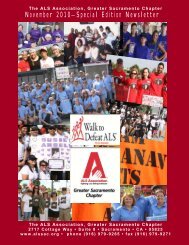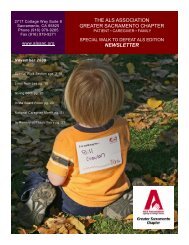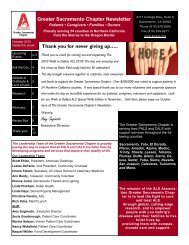October 2012 - The ALS Association Greater Sacramento
October 2012 - The ALS Association Greater Sacramento
October 2012 - The ALS Association Greater Sacramento
You also want an ePaper? Increase the reach of your titles
YUMPU automatically turns print PDFs into web optimized ePapers that Google loves.
Recent Research<br />
Researchers Find Genetic Region Influencing Age at Which People Develop <strong>ALS</strong><br />
<strong>The</strong> <strong>ALS</strong> <strong>Association</strong> announced today that an international consortium of researchers<br />
it convened and funded has identified a region on chromosome 1 that strongly influences<br />
the age at which an individual develops amyotrophic lateral sclerosis (<strong>ALS</strong>). For<br />
the first time, scientists have found that people with <strong>ALS</strong>, who have a specific genetic<br />
signature within this region on chromosome 1, had an age of onset that is approximately<br />
two-and-a-half years earlier than those without it. <strong>The</strong> study was funded in part<br />
by <strong>The</strong> <strong>ALS</strong> <strong>Association</strong> and published today in Neurobiology of Aging.<br />
“<strong>The</strong> discovery of a region or genetic center on chromosome 1 that influences the age at which a person<br />
develops <strong>ALS</strong> is critically important for understanding the disease process,” said Lucie Bruijn, Ph.D., Chief<br />
Scientist for <strong>The</strong> <strong>ALS</strong> <strong>Association</strong>. “<strong>The</strong>re are many pathways that lead to <strong>ALS</strong>, and this new discovery suggests<br />
that there may be common factors to all of these pathways, which may enable researchers to develop<br />
new treatments that help slow or stop the disease.”<br />
<strong>The</strong> study examined the DNA from more than 4,000 <strong>ALS</strong> patients and 5,000 control subjects of Caucasian<br />
origin. Researchers found that those individuals with a specific genetic signature within a region on chromosome<br />
1 had an age of onset approximately two-and-a-half years earlier (56.5-years-old) than those<br />
without the genetic signature (59-years-old). In addition, the study confirmed known genetic risks for <strong>ALS</strong><br />
and suggested novel regions that merit more study.<br />
“Although a 2.5 year delay in the onset of <strong>ALS</strong> may not seem large, it is very important as it is comparable<br />
to the average survival time once diagnosed with <strong>ALS</strong>. <strong>The</strong> fact that it is associated with such a significant<br />
change in the age of <strong>ALS</strong> onset hints at a role in the rate of progression, maybe in accelerating the disease<br />
process,” said Dr. Langefeld. “<strong>The</strong> consistency of this locus’ effect across the 13 Caucasian cohorts is remarkable<br />
and underscores its broad impact.”<br />
This new research was conducted by <strong>The</strong> International Consortium on Amyotrophic Lateral Sclerosis Genetics<br />
(<strong>ALS</strong>GEN), and analyzed by Carl Langefeld, Ph.D., of Wake Forest Baptist Medical Center in Winston-<br />
Salem, North Carolina. This work was supported by <strong>The</strong> <strong>ALS</strong> <strong>Association</strong>, the Packard Center for <strong>ALS</strong> Research<br />
at Johns Hopkins University, and Microsoft Research. This work was also funded in part by the Intramural<br />
Research Program of the NIA and NINDS. Analysis and computing resources were provided by<br />
the Wake Forest School of Medicine Center for Public Health Genomics. For more information: Read our<br />
Upcoming Webinar<br />
Communication Between Caregivers and Those Diagnosed With <strong>ALS</strong><br />
<strong>The</strong> webinar will address how to avoid communication breakdowns, what to do when<br />
they happen, and psycho-social issues related to communication.<br />
November 19, <strong>2012</strong> (Monday) at 11:00 a.m. PT (2:00 p.m. ET)<br />
Speaker: Alisa Brownlee, ATP, <strong>The</strong> <strong>ALS</strong> <strong>Association</strong> <strong>Greater</strong> Philadelphia Chapter<br />
Call-in toll-free number (US/Canada):1-877-668-4490<br />
Session number: 827 014 887<br />
Session password: Atcall1 Click here to attend this webinar.<br />
6


